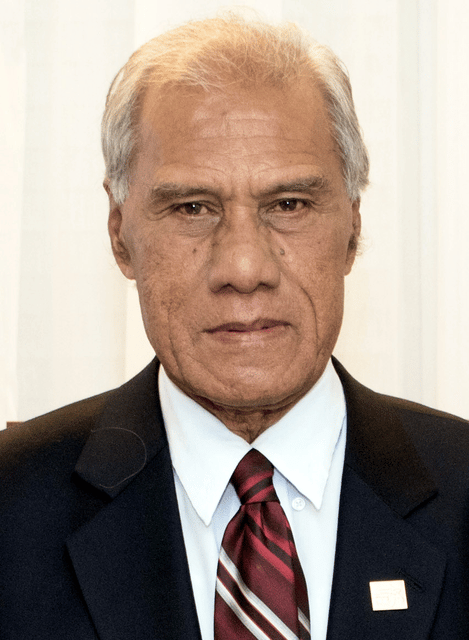ʻAkilisi Pōhiva

ʻAkilisi Pōhiva

ʻAkilisi Pōhiva | |
|---|---|
| 15th Prime Minister of Tonga | |
| In office 30 December 2014 – 12 September 2019 | |
| Monarch | Tupou VI |
| Preceded by | Sialeʻataongo Tuʻivakanō |
| Succeeded by | Semisi Sika (acting) |
| Minister of Foreign Affairs | |
| In office 20 January 2018 – 12 September 2019 | |
| Preceded by | Siaosi Sovaleni |
| Succeeded by | Vacant |
| Minister of Health | |
| In office 4 January 2011 – 13 January 2011 | |
| Prime Minister | Sialeʻataongo Tuʻivakanō |
| Preceded by | Viliami Tangi |
| Succeeded by | ‘Uliti Uata |
| Personal details | |
| Born | Samiuela ʻAkilisi Pōhiva (1941-04-07)7 April 1941 Fakakakai, Haʻapai, Tonga[1] |
| Died | 12 September 2019(2019-09-12)(aged 78) Auckland, New Zealand |
| Political party | Democratic Party of the Friendly Islands |
| Other political affiliations | Human Rights and Democracy Movement (before 2010) |
| Spouse(s) | Neomai Pohiva (died 2018) |
| Alma mater | University of the South Pacific |
Samiuela ʻAkilisi Pōhiva (7 April 1941 – 12 September 2019)[2] was a Tongan pro-democracy activist and politician. Pohiva, the leader of the Democratic Party of the Friendly Islands (DPFI), served as the Prime Minister of Tonga from 2014 to his death in 2019. He was only the fourth commoner to serve as Prime Minister (after Shirley Baker in the 1880s, Siosateki Tonga in the 1890s and Feleti Sevele in the 2000s), and the first commoner to be elected to that position by Parliament rather than appointed by the King. On 25 August 2017, he was dismissed by the King along with the rest of parliament with fresh elections to be held on 16 November, in which his party won with enough seats to form a government.[3][4]
ʻAkilisi Pōhiva | |
|---|---|
| 15th Prime Minister of Tonga | |
| In office 30 December 2014 – 12 September 2019 | |
| Monarch | Tupou VI |
| Preceded by | Sialeʻataongo Tuʻivakanō |
| Succeeded by | Semisi Sika (acting) |
| Minister of Foreign Affairs | |
| In office 20 January 2018 – 12 September 2019 | |
| Preceded by | Siaosi Sovaleni |
| Succeeded by | Vacant |
| Minister of Health | |
| In office 4 January 2011 – 13 January 2011 | |
| Prime Minister | Sialeʻataongo Tuʻivakanō |
| Preceded by | Viliami Tangi |
| Succeeded by | ‘Uliti Uata |
| Personal details | |
| Born | Samiuela ʻAkilisi Pōhiva (1941-04-07)7 April 1941 Fakakakai, Haʻapai, Tonga[1] |
| Died | 12 September 2019(2019-09-12)(aged 78) Auckland, New Zealand |
| Political party | Democratic Party of the Friendly Islands |
| Other political affiliations | Human Rights and Democracy Movement (before 2010) |
| Spouse(s) | Neomai Pohiva (died 2018) |
| Alma mater | University of the South Pacific |
Personal life
Pōhiva worked as a teacher and later studied at the University of the South Pacific before joining the Tongan Teacher Training Staff.[5] He became active in Tonga's pro-democracy movement in the late 1970s, and in the early 1980s contributed to their monthly radio programme, "Matalafo Laukai".[6] In 1984, he was dismissed from the civil service as punishment for his criticism of the government; he subsequently sued them successfully for unfair dismissal.[6] He then became assistant editor of the democracy movement's monthly newsletter, Kele'a.[7]
Pōhiva was married to Neomai Pōhiva, who died in 2018.[8] Pōhiva died at Auckland City Hospital in New Zealand on 12 September 2019, from complications from pneumonia.[9]
Political career
Pōhiva was the longest-serving people's representative in the Tongan Parliament, having first been elected in 1987.[10] His political career was marked by constant battles with the Tongan monarchy over democracy, transparency and corruption. In 1996 he was imprisoned for contempt of Parliament on the order of the Legislative Assembly for reporting on Parliament's proceedings.[11] He was subsequently released after the Supreme Court ruled that the imprisonment was "unlawful and unconstitutional".[12] In 2002 he was charged with sedition over an article published in his newspaper Kele’a alleging the king had a secret fortune,[13] but was acquitted by a jury.[14]
In September 2010, he established the Democratic Party of the Friendly Islands along with other Human Rights and Democracy Movement People's Representatives, in order to contest the 2010 elections.[16] His party secured twelve of the seventeen seats for People's Representatives (the other five going to independent candidates, while representatives of the nobility held an additional nine seats). He announced his intention to stand for the position of Prime Minister. Following constitutional reforms, this would be the first time the Prime Minister was elected by Parliament, rather than appointed by the monarch. The election for the premiership was held on 21 December, between Pōhiva and nobles' representative Lord Tuʻivakanō. Pōhiva obtained twelve votes, but was defeated by Tuʻivakanō, who was elected with fourteen.[17]
Following the election and selection of a Prime Minister he accepted a position in the new Cabinet, as Minister for Health.[18][19] On 13 January, however, he resigned from Cabinet, in protest against the inclusion in Cabinet of members from outside Parliament (to positions which he stated could have been entrusted to members of his party), and also to express his refusal to sign an agreement which would have prevented him from voting (in Parliament) against measures endorsed by Cabinet, based on the principle of collective Cabinet responsibility.[20][21][22] Although there is no formal Opposition, Pōhiva was, from then on, considered the de facto opposition leader.[23]
In December 2013, Parliamentarians for Global Action presented him with their annual Defender of Democracy Award, in recognition of his three and a half decades of campaigning for greater democracy in Tonga. He was the first Pacific Islander to receive the award.[24]
See also
List of foreign ministers in 2017